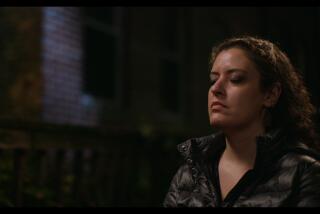Alcohol Addiction Up Close
The hot trend in television this summer is the so-called reality shows, such as âSurvivorâ and âBig Brother.â But that kind of programming pales in comparison with the reality offered up by documentarian Ken Rosenberg in this new HBO special.
âDrinking Apartâ follows three New York City families as they cope with substance abuse. Rosenberg, a psychiatrist who recently received an Emmy nomination for his work on another health-related documentary, films the families with a hand-held camera during various episodes over a three-year period. The families are shown at home, on the street and at the Ackerman Institute for the Family, where all go for counseling.
The documentary depicts the unique tension that exists in relationships that are warped by substance abuse--and how complicated therapy becomes when both love and addiction are at issue. Many of the scenes are filmed at the Ackerman Institute, and one canât help but sympathize with the therapists as they try to guide these families through what seems to be insurmountable conflict. Anyone wary of therapy, however, would be reassured to see how gentle, and gently persuasive, it can be.
Despite the sometimes rushed feeling created by trying to tell three stories in 75 minutes, itâs easy to care about these tortured people. The devastating impact of addictions on spouses, lovers, parents and children is nothing new in the world of documentary filmmaking, but here it is on particularly heartbreaking display.
In one segment, Toinette, an alcoholic experiencing a fragile recovery, is shown trying to make amends to the 14-year-old daughter who was removed from her custody years ago because of Toinetteâs addiction and neglect. The girl wants nothing to do with her mother. In another scene, Toinette, now in a residential recovery center, places a call on a pay phone to another of her children, a toddler at home. Tears stream down Toinetteâs face as she asks, âAre you mad at Mommy?â
Perhaps the story that best illustrates how drug use changes relationships is that of Eric and Jillian, a young couple who met in a bar and moved in together. They are shockingly heavy drinkers. But they appear unable to recognize that alcohol is at the center of their relationship woes. Jillian is sadly unaware of how seriously ill she is. This story points out the need for some relationships to end in order for at least one person to survive.
The most gripping story, however, is that of Patria, a former heroin user, and her daughter, Erica, 17. As a child, Erica watched her mother destroy her life with drugs and begged her to stop. After four years in a residential treatment center, Patria recovered and rejoined her family. But the damage to Erica was done, and she reverses roles with her mother, becoming an alcoholic runaway while Patria tries vainly to help her.
âDrinking Apartâ has no dry statistics on substance abuse or lectures from experts; Rosenberg takes care to let the stories speak for themselves. It has no narrator--only occasional sentences flashed between scenes to provide time references or fill in details.
In the end, viewers will be moved to tears by the discovery that love sometimes survives the very worst of addictions.
More to Read
The complete guide to home viewing
Get Screen Gab for everything about the TV shows and streaming movies everyoneâs talking about.
You may occasionally receive promotional content from the Los Angeles Times.






